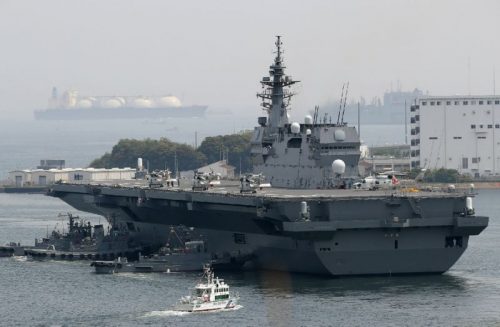TOKYO, Dec 18,, Japan on Tuesday approved plans to convert two ships into aircraft carriers — the nation’s first since World War II — as it tries to counter growing Chinese military power in the region.
The new five-year defence plan calls for the military to upgrade two existing “helicopter carriers” so that they will also be able to launch fighter jets, and is the latest in a series of steps under Prime Minister Shinzo Abe to boost Japan’s military.
Abe’s government argues the efforts are necessary given growing defence challenges in the region, including tensions with North Korea.
Japan says the secretive expansion of China’s military footprint creates “strong concerns” in the region.
But the move is controversial, with critics arguing it moves Tokyo further away from its commitment to strictly defensive capabilities, under Japan’s post-World War II pacifist constitution.
“We will secure both the quantity and quality of defence capability that is necessary… to meet the rapidly changing security environment,” Chief Cabinet Secretary Yoshihide Suga told a regular press briefing on Tuesday.
“We believe this is within… what is allowed under the constitution,” Suga said.
The five-year plan approved Tuesday assumes record defence spending of 27.47 trillion yen ($242 billion) through March 2024.
It calls for the defence ministry to upgrade two flat-top Izumo-class destroyers to enable them to launch fighters with short take-off and vertical landing capacity, like the F35B stealth fighter.
Japan’s government also announced Tuesday that it will over the next decade buy 42 such fighter jets, with the F35B widely considered the likeliest candidate.
It also plans to buy 105 units of the F35A, which performs conventional takeoff and landings and could not be used on the retrofitted destroyers.
Local media have said the purchases could total more than one trillion yen ($8.8 billion).
The new plans come after pledges from Japan to buy more US military equipment, under pressure from President Donald Trump, who has repeatedly complained about Washington’s huge trade deficit with Tokyo.
Abe has aggressively expanded Japan’s alliance with the United States.
He has campaigned for years to amend Japan’s pacifist constitution, arguing that it ties the hands of the country’s Self-Defense Forces (SDF) even in protecting the country from attack.
The government also endorsed guidelines for a 10-year defence policy that puts renewed emphasis on cyber security as well as space defence.
The remodelled ships and new fighter jets will “increase operational flexibility” for Japan’s military as China boosts its naval footprint in southern waters that are home to several remote Japanese islands, a defence official said.
“We have a very, very small SDF footprint” in the area between Okinawa and Taiwan, he added.
But he said it was a “misunderstanding” to believe that the upgrades would create “full-fledged aircraft carriers” capable of staging offensive action in distant regions.
And the new fighter jets would be stationed at existing ground facilities, not on the ships, he said.
“We are not creating carrier air wings or carrier air squadrons” like the US navy, he added.
“That’s not going to happen.” RSS
—

